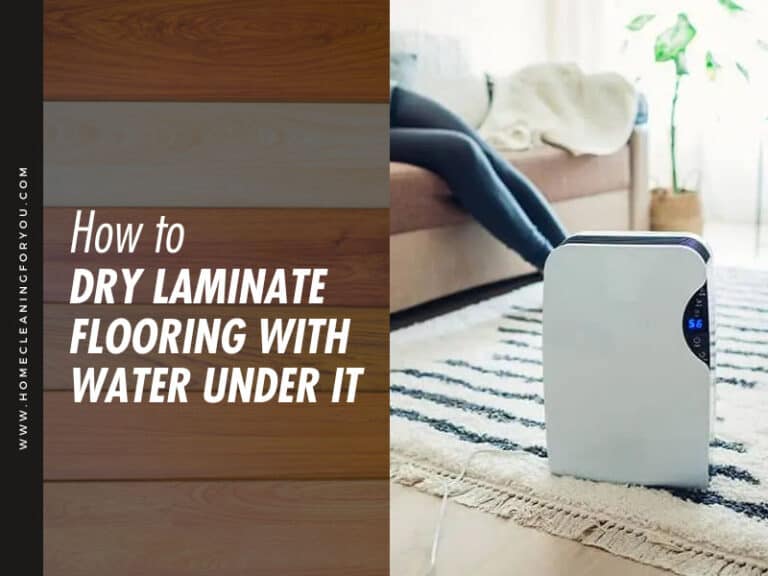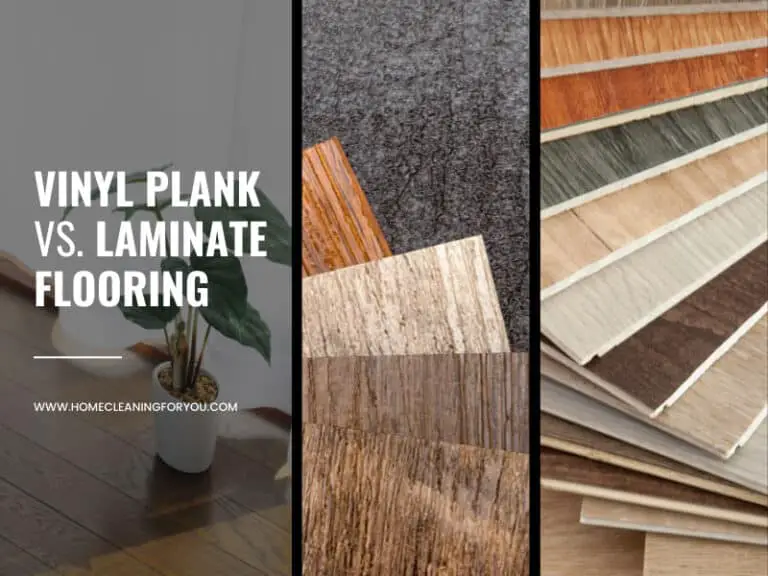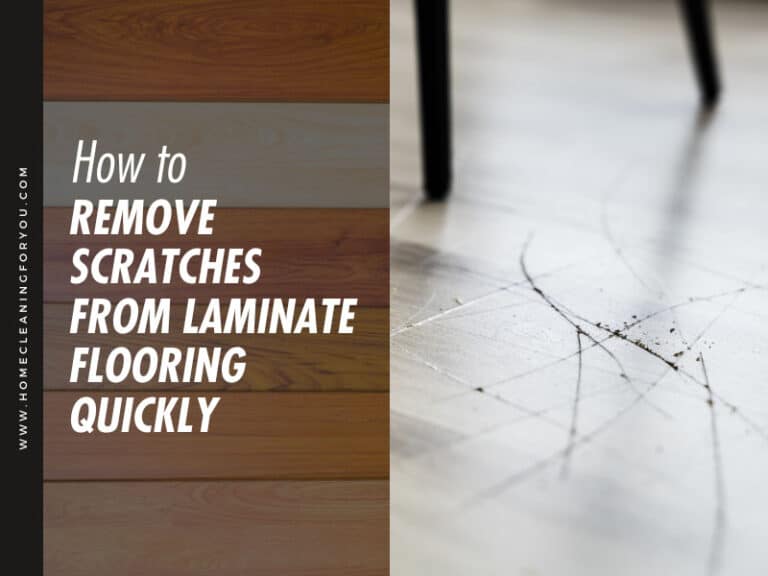Is Laminate Flooring Toxic – Decode All Information 2024

Is laminate flooring toxic? There are various controversies regarding this topic. The number of people who agree with the toxicity of laminate flooring is high, but the opinions against this view also account for a high percentage.
If you do not know which side to take, in this case, you will have your choice after reading this post. You will get detailed and complete answers, and clear explanations and measures to handle in case laminate flooring is toxic.
Primary Knowledge About Laminate Flooring

If you have not used laminate flooring and are looking to learn about it, this section will give you basic information about it. This information is your foundation before diving into the rest.
Laminate flooring is a common and inexpensive flooring made by gluing and pressing layers of wood, paper, and resin together. Thanks to its stain resistance property, this type of floor is pretty convenient as you do not need to maintain it too much.
It is a type of multi-layer composite flooring produced by the laminate method. The fiberboard materials and melamine resin are tightly bonded together by means of formaldehyde.
Laminate flooring has 4 main layers, including wear, design, core, and a back layer. High temperature and strong pressure have created a strong bond between these 4 layers.
- Wear layer: This is the top layer of the floor made of aluminum oxide. Its use is to help prevent stains, dust, and fading of the floor.
- Design layer: This layer is below the wear layer, and it will be printed with patterns like wood or tile to give an eye-catching look to the laminate flooring.
- Core layer: Below the design layer is the core layer. It is made up of many boards and is highly durable. It will prevent damaged floors from moisture and environmental agents.
- Back layer: The bottom layer of the floor will ensure the balance of it as well as prevent the attack of moisture from below the floor.
Compared to hardwood floors and tile floors, laminate flooring has a quite low durability and a short lifespan when it can only last for about 15 years. Besides the low price, the cost and process of installing and cleaning it are inexpensive and straightforward.
It is a cheap alternative to natural wood flooring because its design layer is equipped with patterns and looks pretty similar to real wood. It will help bring the aesthetic of your flooring.
Gain more fantastic and helpful information about the laminate flooring.
Does Laminate Flooring Cause Toxicity?
It is time to find the answer to your question. This section will provide you with specific information and explanations about whether laminate flooring is toxic or not.
Is Laminate Flooring Toxic?

The toxins inside laminate flooring are real. It is made up of wood bonding adhesive, which is harmful and toxic to human and animal health. The adhesive contains toxic components such as formaldehyde, isocyanates, aluminum oxide, and cyanuric acid.
Formaldehyde and other toxins will be released into the air, and you will inhale them through respiration. After installing laminate flooring, you can smell these substances pretty clearly.
The content of formaldehyde and chemicals in laminate flooring is diverse depending on the materials, amount of chemicals, and formaldehyde applied during the manufacturing process. New laminate flooring will emit more toxins.
Formaldehyde and other chemicals are emitted for about 10 years. Their content will gradually decrease over time, so the longer the floor, the less toxic it will be. Factors such as temperature, humidity, and ventilation also influence the amount of gas released.
Especially if you live in a hot climate and high temperature, the emission level of gas will be stronger. Therefore, I recommend installing a strong air conditioning system or switching to other non-toxic floorings such as tile, wood, and bamboo.
The toxins of laminate flooring will affect the health of your respiratory system and cause asthma. In addition, it affects your brain function and kidney damage.
Laminate flooring types are laminated and glued from trips, fibers, chips, and strands will contain formaldehyde. Polywood, particleboard, medium-density fiberboard are flooring with high toxic content.
Why Is Laminate Flooring Considered Toxic?

The chemicals that make laminate flooring are toxic over time. However, the melamine resin formaldehyde component in the adhesive is considered the leading agent that causes the toxicity of the laminate flooring.
There are different types of formaldehyde that you can find from adhesive, including urea-formaldehyde (UF), phenol-formaldehyde (PF), and melamine-formaldehyde (MF). They are usually found in the wear and core layer with many adhesives.
Urea-formaldehyde (UF) releases much formaldehyde into the air, and it does not take much time and effort to get rid of it. However, it does not satisfy the legal requirements to apply for flooring.
Compared with the other two formaldehyde, phenol-formaldehyde (PF) is dark in color and emits the least amount of formaldehyde. However, it costs a lot of money and is not widely used. In addition, you need to apply the best treatment to cure.
Melamine-formaldehyde (MF) is the most widely known. The amount of gas it emits is less than urea-formaldehyde but more than phenol-formaldehyde. However, the melamine added during the manufacturing process lowers emission levels.
Dangers And Symptoms Of Formaldehyde That Released From Laminate Floor

Formaldehyde is a colorless gas with a pungent odor. It is a combination of compounds, such as oxygen, hydrogen, and carbon. It is found in many building materials and household items. In addition, you can smell it when opening nail polish or new paint.
Thanks to its antiseptic properties, medical products are often added for better preservation. Besides, in the construction field, it is used to make glue to stick at the construction site. It is also found in clean products and used to preserve food.
Formaldehyde was classified as a carcinogen by the EPA in 1987. Studies have also shown a high risk of cancer and other health problems from breathing in formaldehyde (1). In the 2000s, it was confirmed as carcinogenic to humans by IARC.
In particular, laminate flooring will emit this gas for a long time, and it will affect the health of your respiratory system, especially the elderly.
Asthma is a common symptom if you breathe in a lot of formaldehyde over a long period of time from laminate flooring. Moreover, your eyes, skin, nose, and throat are also affected by low formaldehyde levels. More seriously, it is a causative agent for many types of cancer.
Some essential things you need to know about formaldehyde in laminate flooring.
Dangers Of Other Chemical Components

Besides formaldehyde, other chemical components from laminate flooring also cause serious health effects. Here are the problems you may encounter when absorbing the toxins of laminate flooring.
Aluminum oxide is a compound made of aluminum and oxygen. This substance is usually crystalline in color (2). When you inhale this chemical from laminate flooring, you run the risk of asthma and reduced brain function.
Isocyanates are chemical compounds considered potential carcinogens. They have adverse effects on your health by causing irritation to the skin, nose, and eyes and making it difficult to breathe. Moreover, they cause lung-related diseases and asthma (3).
Melamine and cyanuric acid is a chemical component that is released into the air by laminate flooring. Therefore, when you inhale this compound, your kidney health will be seriously affected because it will damage the kidneys and cannot be restored.
What Are The Volatile Organic Compounds (VOCs) In Laminate Flooring?
When it comes to harmful gases and substances emitted from laminate flooring, you need to know Volatile Organic Compounds (VOCs). These are toxic gases emitted from the chemical components inside the adhesive.
The level of VOCs of different types of laminate floor will not be the same. When you look at the VOC, you get an idea of how toxic the laminate floor can be. You can see the VOCs on the packaging when you buy the floor. This gas will cause respiratory diseases.
Is It Necessary To Worry About The Formaldehyde In Laminate Flooring In Your Home?
You do not need to worry about the formaldehyde content of your laminate flooring because it is pretty diverse. Formaldehyde is commonly found in indoor and outdoor air at low levels with less than 0.03 ppm.
If you live in a rural area, levels of this toxic gas are even lower, while levels in urban areas will be higher. In particular, buildings and offices with laminate flooring installed can emit formaldehyde in excess of 0.03 ppm.
Besides, the humidity, temperature, and well-ventilated will change the rates of formaldehyde inside your house. Depending on days and seasons, this level can fluctuate. The colder and drier the weather is, the lower formaldehyde concentration is. The level of this substance will be reduced over time.
How To Reduce Laminate Flooring Toxicity?

It is possible that you can reduce the toxicity of your laminate flooring. These measures are pretty simple for you to take, so please apply them to protect your health and your family.
- You need to create an airy space by opening the windows daily to clean the air and raise ventilation inside your house.
- It is good to stop smoking in a room with laminate flooring because tobacco includes formaldehyde, when combined with toxins in laminate flooring, will enhance the toxic level of the room.
- Create an air circulation system by installing powerful air conditioners or exhaust fans to remove toxic air from the outside.
- You need to keep the temperature and humidity in the room low to ensure that the room has enough coolness and ventilation to decrease the amount of toxic gas emitted by laminate flooring.
- You should check the information on products used to clean floors that contain chemicals before cleaning, even when cleaning with a dry or wet mop.
- When choosing furniture, you should avoid furniture containing formaldehyde to avoid increasing toxic levels in the room.
- If you do not want to breathe in byproducts and formaldehyde in the air, you should pull out the old facemask for about a few days.
- You should install an air purification system to filter formaldehyde in the air before you inhale it. However, it only solves the problem temporarily and cannot completely remove formaldehyde.
- Shouldn’t spread a rug on the floor surface
- For new laminate flooring products, you should leave them in a large space such as a garage or on a patio until you can no longer smell the bad odors before installing.
- You need to use products that contain little or no formaldehyde and VOCs. Wood products without urea-formaldehyde glue and pressed-wood products that do not have formaldehyde or emit low gas are good for your health.
- Use low-VOC or no-VOC products and insulation without containing UF foam.
- You should wash permanent-press clothing and curtains before using new laminate flooring products.
Tricks To Buy Non-Toxic Laminate Flooring

Besides applying methods to reduce the toxicity of laminate flooring, you can apply the following tips when buying laminate flooring to choose a perfect and low-toxic laminate flooring.
- Toxic substances come from the adhesive, so you need to choose laminate flooring that is non-adhesive and has a lower formaldehyde content of .03 ppm (Parts Per Million).
- When choosing laminate flooring, read the product information to choose a laminate floor with low VOCs or non-VOCs.
- To get non-toxic laminate flooring, you need to buy products with GreenGuard or GreenGuard Gold certification. These are products that have undergone rigorous chemical emission checking.
- Cheap laminate flooring will not guarantee your health because it contains more harmful substances than standard and expensive laminate flooring.
- The best way to reduce the toxicity of laminate flooring is to choose flooring that has a click-together floating installation mechanism instead of glue-down products because the floor will be locked and snapped without using glue to stick.
- Before purchasing laminate flooring, you should ask the manufacturer because they can release the gas before shipping.
- Before installing the flooring, it is good to place laminate flooring in other spacious areas and cover them to protect them from environmental elements. Meanwhile, the floor will emit a part of the toxic.
- You should select the laminate flooring products printed with water-based ink.
Listen to some fantastic tips to choose a healthy laminate flooring.
Should You Uninstall Toxic Laminate Flooring?

As I have shown, the longer the laminate flooring is installed, the less toxic residue will be left, so if you remove the toxic laminate flooring and replace it with a new one, the toxicity level will increase.
In case you smell unpleasant chemical odors in your home and have problems related to your respiratory system health, you should hire a professional to check the air inside the room before deciding to uninstall and replace the new floor.
Testing the air in the house will help you know the formaldehyde content of laminate flooring for further treatment measures. However, testing for formaldehyde will not guarantee absolute accuracy, so you should listen to the opinion of an expert.
Non-Toxic Flooring Options For You To Select

In case you do not want the toxicity of laminate flooring to affect your health, you should use the toxin-free floorings below to ensure a clean atmosphere for your house.
Tile floor: If you want a floor with high durability and aesthetics, you can use tile flooring. It is synthesized from natural materials and is non-toxic, harmless to health and the environment. In addition, it does not contain the formaldehyde component.
Real wood floor: Instead of using laminate flooring, you can use real wood flooring to bring authenticity, durability, and aesthetics to your home. It is made entirely from natural wood and does not contain formaldehyde.
Bamboo floor: This is a good quality floor. Furthermore, harmful chemical components do not exist on the bamboo floor, so it will help protect your health.
Cork floor: It is a natural product made from the bark of a tree and does not contain any unhealthy chemical components. In addition, it is pretty durable and has a high aesthetic.
Concrete, ceramic, and porcelain floors: You will not have to worry about contamination when using these floors because they are free of lead, radioactive components, and formaldehyde.
Palm floor: This type is pretty similar to bamboo flooring. It is made of natural and eco-friendly material. In particular, you will not be afraid of your health being affected by formaldehyde when using palm flooring.
Natural carpets: The natural carpet is a good choice to protect your health. There is not any formaldehyde content inside the natural carpet. You should choose carpets with wool and natural latex as the main elements and dyed with non-toxic pads and no stain repellents.
FAQs
Besides the essential information I introduced above, you need to find out more information to boost your knowledge on this fascinating topic through the questions below.
Do Not Panic And Change The Entire Floor!
Through this article, I am sure you have a better understanding of laminate flooring, especially in terms of health protection. Although laminate flooring is toxic, you can also find ways to reduce its toxicity.
Therefore, you should not panic and change your entire floor. What you should do is listen to professionals. Now, it is easy to answer the question about laminate toxicity when you receive it from your friend.








Kevin Jones
Home Cleaning Specialist
Expertise: In-depth Knowledge of Cleaning Agents and Their Uses, Advanced Home Sanitization, Techniques Expertise in Cleaning and Maintaining, Various Floor Types, Innovations in Home Cleaning Tools
School: American College of Home Economics
Kevin Jones is a seasoned home cleaning specialist with over a decade of experience in the industry. A stickler for cleanliness and organization, Kevin brings a systematic and innovative approach to home maintenance. His expertise ranges from traditional methods to modern cleaning technology, ensuring homes are not just clean but healthy environments too.